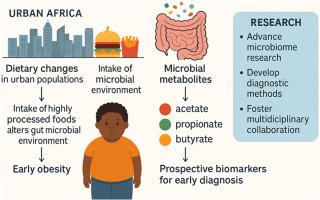Gut microbiota-derived metabolites as early biomarkers for childhood obesity: A policy commentary from urban African populations
Q2 Medicine
引用次数: 0
Abstract
Obesity among children is rapidly increasing in urban African settings due to the Westernisation of diets and decreased physical exercise, as well as socioeconomic inequality. Changes in the composition of gut microbiota, especially depletion of short-chain fatty acids (SCFAs), increase in branched-chain amino acids (BCAAs), and alterations in the bile acid metabolism, are becoming early, non-invasive predictors of metabolic risk. Though comparable microbiome-based early-detection models have been designed regarding Latin American and Asian paediatric populations, the commentary aims at the African urban setting, where a combination of undernutrition and obesity, the use of street foods and the rapid urban-rural migration generate unique microbial profiles. We synthesise data in Nairobi, Kampala, and Lagos, including region-specific taxa such as Succinivibrio, Treponema, and Methanobrevibacter. Our suggestions are specific, low-cost interventions, such as the incorporation of fiber-rich foods into national school feeding programs and the use of Ghana-developed lateral-flow SCFA assays that cost less than US$2 per test. This is a policy-orientated narrative with no collection of primary data. The search of literature in PubMed, Scopus, and African health research repositories (2015–2025) was carried out with the use of the terms associated with gut microbiota, childhood obesity, microbial metabolites, and Africa. Our focus is to transform microbiome science into scalable, culturally appropriate, and cost-effective public health interventions.

肠道微生物衍生代谢物作为儿童肥胖的早期生物标志物:来自非洲城市人口的政策评论
由于饮食西化、体育锻炼减少以及社会经济不平等,非洲城市儿童肥胖人数正在迅速增加。肠道菌群组成的变化,特别是短链脂肪酸(SCFAs)的消耗、支链氨基酸(BCAAs)的增加和胆汁酸代谢的改变,正在成为代谢风险的早期、非侵入性预测指标。虽然针对拉丁美洲和亚洲儿科人群设计了可比较的基于微生物组的早期检测模型,但该评论针对的是非洲城市环境,在那里,营养不良和肥胖、街头食品的使用以及城乡快速迁移共同产生了独特的微生物图谱。我们综合了内罗毕、坎帕拉和拉各斯的数据,包括特定区域的分类群,如琥珀酸弧菌、密螺旋体和甲烷杆菌。我们的建议是具体的、低成本的干预措施,例如将富含纤维的食物纳入国家学校供餐计划,以及使用加纳开发的每次检测成本低于2美元的横向流动SCFA检测方法。这是一种以政策为导向的叙述,没有收集原始数据。在PubMed、Scopus和非洲卫生研究资料库(2015-2025)中检索文献,使用与肠道微生物群、儿童肥胖、微生物代谢物和非洲相关的术语。我们的重点是将微生物组科学转化为可扩展的、文化上适当的、具有成本效益的公共卫生干预措施。
本文章由计算机程序翻译,如有差异,请以英文原文为准。
求助全文
约1分钟内获得全文
求助全文
来源期刊

Obesity Medicine
Medicine-Public Health, Environmental and Occupational Health
CiteScore
5.50
自引率
0.00%
发文量
74
审稿时长
40 days
期刊介绍:
The official journal of the Shanghai Diabetes Institute Obesity is a disease of increasing global prevalence with serious effects on both the individual and society. Obesity Medicine focusses on health and disease, relating to the very broad spectrum of research in and impacting on humans. It is an interdisciplinary journal that addresses mechanisms of disease, epidemiology and co-morbidities. Obesity Medicine encompasses medical, societal, socioeconomic as well as preventive aspects of obesity and is aimed at researchers, practitioners and educators alike.
 求助内容:
求助内容: 应助结果提醒方式:
应助结果提醒方式:


